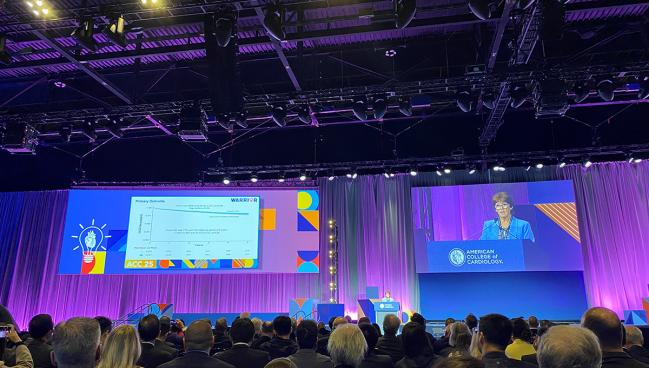WARRIOR: No Clear Answers on How to Best Treat INOCA
The “neutral” trial, troubled by the COVID-19 pandemic, found that intensive medical therapy didn’t lower events in INOCA.

CHICAGO, IL—Intensive medical therapy (IMT), compared with usual care, fails to reduce the risk of cardiovascular events at 5 years in women who have ischemia with nonobstructive coronary arteries (INOCA), according to results from the long-awaited WARRIOR trial.
The study was plagued with trouble recruiting patients during the COVID-19 pandemic—it enrolled just 55% of a planned 4,476 participants—and by its pragmatic design: half of patients randomized to usual care received many of the same drugs assigned in the active-treatment arm.
Researchers called the findings “neutral,” saying WARRIOR was underpowered to test their hypothesis that IMT could reduce MACE by 20% by 5 years.
“This should not be interpreted as endorsing discontinuation of statin or ACE or ARB medications among women with CV risk factors,” said Eileen Handberg, PhD (University of Florida, Gainesville), who presented the data here today in the first late-breaking clinical trial session of the American College of Cardiology (ACC) 2025 Scientific Session.
That so many women in the usual care arm were prescribed drugs like statins and ARBs is “a positive” and due to the high rates of hypertension and hypercholesterolemia being properly treated, Handberg told TCTMD. “The question is whether or not we can come up with a therapeutic regimen that will reduce their symptoms of chest pain.”
Studies like CorMiCA have hinted at the potential for antianginal medications to make a difference in patients with INOCA, but clinical practice is full of variation. With the large impact the disease has on patient quality of life, physicians have been eager for more solid evidence to guide treatment decisions.
Harmony Reynolds, MD (NYU Langone Health, New York, NY), called WARRIOR a “huge milestone for this field” despite not showing a benefit. “We all love our positive trials and are disappointed when we don't get a positive trial. That's just human nature,” she told TCTMD. But “having WARRIOR on the stage at the American College of Cardiology—a completed large, several-thousand-patient clinical trial—is a really important step.”
No Differences
In the end, WARRIOR enrolled 2,476 women (mean age 64 years; 89% white) who presented with INOCA at one of 71 US medical centers. They were randomized to receive intensive medical therapy—consisting of a high-intensity statin, an ACE inhibitor or ARB at the maximally tolerated dose, and low-dose aspirin—or usual care, in which prescription decisions were left up to the treating physician.
About half of each group were diagnosed using coronary computed tomography angiography (CCTA) and the other half using invasive angiography. Hypertension was present at baseline in about two-thirds of patients, and diabetes in about one in five. The vast majority were postmenopausal and overweight. Baseline medications included statins in more than two-thirds, ACE inhibitors or ARBs in about half, beta-blockers in just over two-thirds, calcium channel blockers in one-quarter, and aspirin in just under two-thirds.
This should not be interpreted as endorsing discontinuation of statin or ACE or ARB medications among women with CV risk factors. Eileen Handberg
At 5 years, there was no significant difference in the composite risk of all-cause death, MI, stroke or hospitalization for worsening angina, or heart failure between the study arms (HR 1.13; 95% CI 0.94-1.37). Notably, 83.4% of events were hospitalization for chest pain, which “supports our understanding of the patient and physician burden seen in this population,” reported Handberg.
Rates of the individual MACE components as well as quality-of-life endpoints also did not differ between IMT and usual care. Similar findings were observed in a variety of subgroup analyses as well as a contamination analysis accounting for the percentage of patients taking IMT in both study arms.
‘Very Understudied Area’
Eugenia Gianos, MD (Lenox Hill Hospital, New York, NY), who spoke with the media during an ACC press conference, praised the study for attempting to add more data to a “very understudied area of women's heart diseases. This is a syndrome that essentially translates into a lot of morbidity for women that we need continued research in the study.”
While WARRIOR had a “very good design and very good goals,” it ultimately fell victim to complications of the pandemic that have had a widespread ripple effect throughout the field of medical research, she said. “I agree with the study author that this is a neutral trial, something that was not able to essentially show what it was designed to show.”
While the trial had to be pragmatically designed, “we do have the issue sometimes in pragmatic studies of a less-than-ideal separation between arms and treatment, and that happened to WARRIOR,” added Reynolds. “We are still left with a few questions, but I think it's still a very important trial.”
Discussing WARRIOR during today’s session, Pamela Douglas, MD (Duke Clinical Research Institute, Durham, NC), stressed that a pragmatic trial design cannot be conflated with what might be expected from an efficacy trial design, where “things are tightly controlled and intervention can be designed and delivered seamlessly, but at great cost to participants, to the study, and to the sites.”
With regard to the wide variation in what constitutes usual care for INOCA, Reynolds said that is to be expected “when there isn’t an established set of therapies for a problem” and people go with their “best guess.” This underscores the need for future trials in this space, she added.
The researchers reported several ongoing ancillary studies looking at both quality of life and cardiovascular outcomes using AI to analyze CCTA data as well as biomarker analyses.
Handberg said she’d also like to see more work done examining medication tolerability. “You get a cohort of women who start out symptomatic because they went to the emergency room, but they don't continue to have angina,” she said. “Then the question is: why do I need to be treated? Especially when you've been told in the emergency room that there's nothing to matter with you.”
With a “complex disease state” and many “very dismissive” clinicians, Handberg said, “we have a lot of work to do to figure out how to optimize care.”
Yael L. Maxwell is Senior Medical Journalist for TCTMD and Section Editor of TCTMD's Fellows Forum. She served as the inaugural…
Read Full BioSources
Handberg E. Women’s IschemiA Trial to Reduce Events In Non-ObstRuctive CAD. Presented at: ACC 2025. Chicago, IL. March 29, 2025.
Disclosures
- WARRIOR was funded by the US Department of Defense (DOD).
- Handberg reports receiving consultant fees/honoraria from Milestone Pharmaceuticals, Novo Nordisk, Preventative Cardiovascular Nurses Association, Sanofi and receiving research grants from Abbott, Ablative Solutions, American Heart Association, Biocardia, DOD, Evaheart, National Institutes of Health, and PCORI.
- Reynolds reports serving as the PI for the INOCA-CARE trial and serving as a consultant for Heartflow.





Comments